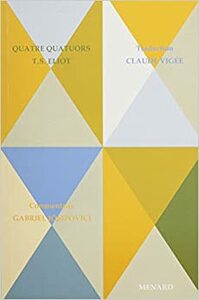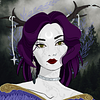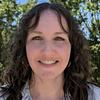Take a photo of a barcode or cover
inspiring
reflective
medium-paced
I’ve been carrying this copy of Four Quartets around with me this year and reading it whenever I have a spare moment. It has been a marvelous companion, and I’ve loved each moment with these words and ideas. Here at the end of the year, I read through all the poems in one sitting, listening to the recording by Alec Guinness. It felt like a very appropriate way to end the year, contemplating our movement through time and seasons, and our need for true wisdom and understanding on the journey.
emotional
hopeful
reflective
challenging
reflective
slow-paced
I'm new to reading poetry, so I can't comment much about fancy poetic devices or alliteration. Still, though, these four poems really spoke to me. I especially loved T.S. Eliot's insights into time and the circle of life.
“Time present and time past
Are both perhaps present in time future
And time future contained in time past.”
“For last year's words belong to last year's language
And next year's words await another voice.”
“We shall not cease from exploration
And the end of all our exploring
Will be to arrive where we started
And know the place for the first time.
Through the unknown, remembered gate
When the last of earth left to discover
Is that which was the beginning;
At the source of the longest river
The voice of the hidden waterfall
And the children in the apple-tree
Not known, because not looked for
But heard, half-heard, in the stillness
Between two waves of the sea.”
“Time present and time past
Are both perhaps present in time future
And time future contained in time past.”
“For last year's words belong to last year's language
And next year's words await another voice.”
“We shall not cease from exploration
And the end of all our exploring
Will be to arrive where we started
And know the place for the first time.
Through the unknown, remembered gate
When the last of earth left to discover
Is that which was the beginning;
At the source of the longest river
The voice of the hidden waterfall
And the children in the apple-tree
Not known, because not looked for
But heard, half-heard, in the stillness
Between two waves of the sea.”
I know no shortage of people who think the Four Quartets are beautiful and amazing. Well, it may be -- and I say this without cynicism -- that you have to be taught how to find them beautiful and amazing. Certainly, I've noticed that people bring a lot of external information to them -- I read a portion out loud, and Mrs. said something about how terrible it must have been to live through bombing, which is certainly true, except: the poem hadn't said anything about bombing. Does it count as a poignant response to bombing, if you have to learn from the Wiki that it's a poignant response to bombing? I don't know. Recurringly, too, the poems seem to be largely "about" the way that past and future can only be experienced within the present, which is... not very interesting? I mean, if you are the kind of person who thinks about how you experience time, you notice at some point that the past and future can only be experienced within the present, and then you get used to it as you do to riding a bicycle, and you get on with experiencing the past and future within the present. I'm not sure you need to listen to someone else meditate on the concept for sixty pages.
It is a given that if others find beauty in these poems and I don't, it is my loss. However, as a matter of report, I'll say not only did I find most of the text here dull, much of it I did not find particularly poetic. Despite its reputation of immaculate craftsmanship, long passages read like circuitous prose typeset according to poetic conventions. The bits where metrical rhyming broke out were certainly the most interesting and admirable. This is not surprising, because -- as everyone knows in their heart of hearts -- poetry that has a rhyming scheme is, all other things being equal, inherently more interesting and compelling than poetry that does not.
In sum, obviously I am reading the Four Quartets all wrong and will have to go back and try again when I'm a little older.
It is a given that if others find beauty in these poems and I don't, it is my loss. However, as a matter of report, I'll say not only did I find most of the text here dull, much of it I did not find particularly poetic. Despite its reputation of immaculate craftsmanship, long passages read like circuitous prose typeset according to poetic conventions. The bits where metrical rhyming broke out were certainly the most interesting and admirable. This is not surprising, because -- as everyone knows in their heart of hearts -- poetry that has a rhyming scheme is, all other things being equal, inherently more interesting and compelling than poetry that does not.
In sum, obviously I am reading the Four Quartets all wrong and will have to go back and try again when I'm a little older.
challenging
“Go, go, go, said the bird: human kind / Cannot bear much reality. /Time past and time future / What might have been and what has been / Point to one end, which is always present.” 4
“ I am here / Or there, or elsewhere. In my beginning.” (14)
hebetude (noun) the state of being dull or lethargic
“The only wisdom we can hope to acquire / Is the wisdom of humility: humility is endless.” (16)
“ I said to my soul, be still, and let the dark come upon you” (16)
“I said to my soul, be still and wait without hope, for hope would be hope for the wrong thing; wait without love, for love would be love of the wrong thing; there is yet faith, but the faith and the love are all in the waiting. Wait without thought, for you are not ready for thought: So the darkness shall be the light, and the stillness the dancing.”
You say I am repeating / Something I have said before. I shall say it again / Shall I say it again?” (17)
“So here I am … Trying to learn to use words, and every attempt / is a wholly new start, and a different kind of failure” (19)
“Home is where one starts from” (19)
“While time is withdrawn / consider the future / And the past with equal mind.” (28)
“ Or music heard so deeply / That is not heard at all , but you are the music / While the music lasts.” (30)
“For last year’s words belong to last year’s language / And next year’s words await another voice.” (39)
“This is the use of memory: / For liberation – not less of love but expanding / Of love beyond desire, and so liberation / From the future as well as the past.” (40)
“Every phrase and every sentence is an end and a beginning” (42)
“We shall not cease from exploration / And the end of our exploring / Will be to arrive where we started / And know the place for the first time.” (43)
“And all shall be well and / All manner of things shall be well” (43)
“ I am here / Or there, or elsewhere. In my beginning.” (14)
hebetude (noun) the state of being dull or lethargic
“The only wisdom we can hope to acquire / Is the wisdom of humility: humility is endless.” (16)
“ I said to my soul, be still, and let the dark come upon you” (16)
“I said to my soul, be still and wait without hope, for hope would be hope for the wrong thing; wait without love, for love would be love of the wrong thing; there is yet faith, but the faith and the love are all in the waiting. Wait without thought, for you are not ready for thought: So the darkness shall be the light, and the stillness the dancing.”
You say I am repeating / Something I have said before. I shall say it again / Shall I say it again?” (17)
“So here I am … Trying to learn to use words, and every attempt / is a wholly new start, and a different kind of failure” (19)
“Home is where one starts from” (19)
“While time is withdrawn / consider the future / And the past with equal mind.” (28)
“ Or music heard so deeply / That is not heard at all , but you are the music / While the music lasts.” (30)
“For last year’s words belong to last year’s language / And next year’s words await another voice.” (39)
“This is the use of memory: / For liberation – not less of love but expanding / Of love beyond desire, and so liberation / From the future as well as the past.” (40)
“Every phrase and every sentence is an end and a beginning” (42)
“We shall not cease from exploration / And the end of our exploring / Will be to arrive where we started / And know the place for the first time.” (43)
“And all shall be well and / All manner of things shall be well” (43)
relaxing
fast-paced
challenging
reflective
fast-paced
A classic I read for a book club. I am not a poetry person…it just does not make sense to me. If my “hand is held” all the way through so that I am able to understand it, I can tolerate it. Otherwise, it’s just a jumble of words on a page and I have no time for that. I even found the author in YouTube reading the poems aloud, as the bookclub suggested. I found it to be still a jumble of words coming out of someone’s mouth. No thanks.




